Preventing Good People from Doing Bad Things: Implementing Least Privilege
Copyright 2011 by John Mutch, Brian Anderson
All rights reserved. No part of this work may be reproduced or transmitted in any form or by any means, electronic or mechanical, including photocopying, recording, or by any information storage or retrieval system, without the prior written permission of the copyright owner and the publisher.
ISBN-13 (pbk): 978-1-4302-3921-5
ISBN-13 (electronic): 978-1-4302-3922-2
Trademarked names may appear in this book. Rather than use a trademark symbol with every occurrence of a trademarked name, we use the names only in an editorial fashion and to the benefit of the trademark owner, with no intention of infringement of the trademark.
Lead Editor: Jeffrey Pepper
Editorial Board: Steve Anglin, Mark Beckner, Ewan Buckingham, Gary Cornell,
Jonathan Gennick, Jonathan Hassell, Michelle Lowman, James Markham,
Matthew Moodie, Jeff Olson, Jeffrey Pepper, Frank Pohlmann, Douglas
Pundick, Ben Renow-Clarke, Dominic Shakeshaft, Matt Wade, Tom Welsh
Coordinating Editor: Jennifer L. Blackwell
Copy Editor: Ralph Moore
Compositor: Mary Sudul
Indexer: SPi Global
Cover Designer: Anna Ishschenko
Distributed to the book trade worldwide by Springer-Verlag New York, Inc., 233 Spring Street, 6th Floor, New York, NY 10013. Phone 1-800-SPRINGER, fax 201-348-4505, e-mail .
For information on translations, please contact us by e-mail at .
Apress and friends of ED books may be purchased in bulk for academic, corporate, or promotional use. eBook versions and licenses are also available for most titles. For more information, reference our Special Bulk SaleseBook Licensing web page at
The information in this book is distributed on an as is basis, without warranty. Although every precaution has been taken in the preparation of this work, neither the author(s) nor Apress shall have any liability to any person or entity with respect to any loss or damage caused or alleged to be caused directly or indirectly by the information contained in this work.
With gratitude to the BeyondTrust team and
Brian Anderson for his insightful work on this
project and with love to my four children
Natalie, Garrett, Annabelle, and Lauren,
whose support and love sustain me every day.
John
For all of those insider heroes who fight to
prevent the misuse of privilege on a daily basis in
order to help secure precious information assets.
Brian
Contents
About the Authors
 John Mutch has been an operating executive and investor in the technology industry for over 30 years and has a long, sustained track record of creating shareholder value through both activities. Since 2008, he has served as chief executive officer (CEO) at BeyondTrust, the industry leader in mitigating insider threats across physical, virtual, and cloud information technology. Prior to joining BeyondTrust, Mutch was a founder and managing partner of MV Advisors, LLC, a strategic block investment firm that provides focused investment and strategic guidance to small- and mid-cap technology companies. Prior to founding MV Advisors, Mutch was appointed by a US bankruptcy court to the board of directors of Peregrine Systems in March 2003. He assisted that company in a bankruptcy workout proceeding and was named president and CEO in July 2003. Mutch ran Peregrine Systems, operating the company under an SEC consent decree, restating five years of operating results and successfully restructuring the company, culminating in a sale to Hewlett Packard for $425 million in December 2005. Prior to running Peregrine, Mutch served as president, CEO, and a director of HNC Software, an enterprise analytics software provider. Under his leadership, the company nearly doubled revenue and successfully spun out Retek in an IPO that returned more than $2.5 billion to shareholders. HNC Software was sold to Fair Isaac Corporation in August 2002 for $825 million. Prior to HNC Software, Mutch spent seven years at Microsoft Corporation in a variety of executive sales and marketing positions. He previously served on the boards of Edgar Online (NASDAQ: EDGR), Aspyra (Amex: APY), Overland Storage (NASDAQ: OVRL), and Brio Software.
John Mutch has been an operating executive and investor in the technology industry for over 30 years and has a long, sustained track record of creating shareholder value through both activities. Since 2008, he has served as chief executive officer (CEO) at BeyondTrust, the industry leader in mitigating insider threats across physical, virtual, and cloud information technology. Prior to joining BeyondTrust, Mutch was a founder and managing partner of MV Advisors, LLC, a strategic block investment firm that provides focused investment and strategic guidance to small- and mid-cap technology companies. Prior to founding MV Advisors, Mutch was appointed by a US bankruptcy court to the board of directors of Peregrine Systems in March 2003. He assisted that company in a bankruptcy workout proceeding and was named president and CEO in July 2003. Mutch ran Peregrine Systems, operating the company under an SEC consent decree, restating five years of operating results and successfully restructuring the company, culminating in a sale to Hewlett Packard for $425 million in December 2005. Prior to running Peregrine, Mutch served as president, CEO, and a director of HNC Software, an enterprise analytics software provider. Under his leadership, the company nearly doubled revenue and successfully spun out Retek in an IPO that returned more than $2.5 billion to shareholders. HNC Software was sold to Fair Isaac Corporation in August 2002 for $825 million. Prior to HNC Software, Mutch spent seven years at Microsoft Corporation in a variety of executive sales and marketing positions. He previously served on the boards of Edgar Online (NASDAQ: EDGR), Aspyra (Amex: APY), Overland Storage (NASDAQ: OVRL), and Brio Software.
Mutch currently serves on the board of Adaptec, Inc. (Nasdaq: ADPT) as a director designee of Steel Partners and the board of Agilysys (Nasdaq: AGYS) as a director designee of Ramius Capital. He holds a Master's in business administration from the University of Chicago and a Bachelor of Science degree from Cornell University, where he serves on the advisory board for the undergraduate school of business.
 Brian Anderson brings more than 25 years of global enterprise software and security industry experience to this book. He has a track record for award-winning branding and product launches, as well as inbound and outbound marketing models to low-touch, scalable, measureable, and predictable results. Anderson is a frequent industry spokesperson and a published author. Since 2009, he has served as chief marketing officer at BeyondTrust, where he is responsible for all aspects of corporate brand development, as well as lead and demand generation to increase awareness and interest in all customer and investor segments.
Brian Anderson brings more than 25 years of global enterprise software and security industry experience to this book. He has a track record for award-winning branding and product launches, as well as inbound and outbound marketing models to low-touch, scalable, measureable, and predictable results. Anderson is a frequent industry spokesperson and a published author. Since 2009, he has served as chief marketing officer at BeyondTrust, where he is responsible for all aspects of corporate brand development, as well as lead and demand generation to increase awareness and interest in all customer and investor segments.
Prior to BeyondTrust, Anderson served as a serially successful CMO for several venture-funded companies and senior executive at publicly traded companies. At Siderean Software, his branding efforts garnered rave reviews and numerous awards. At Avamar Technologies, his leadership resulted in a huge revenue increase and numerous awards. Avamar was subsequently acquired by EMC. Prior to Avamar, Anderson was program director of marketing for IBM Tivoli Security and Storage, after successfully building industry leader Access360's brand and sales pipeline and positioning for a sale to IBM in 2002. Anderson also served as CMO of HNC Software, and for seven years prior to HNC at FileNet Corporation, culminating in his role as vice president of worldwide corporate marketing. He received his Bachelor of Science degree in computer science from the University of New Orleans.
Acknowledgments
The authors would like to first acknowledge and thank all of the customers, analysts, and industry luminaries who contributed their real-world experiences, observations, stories, and words of wisdom: Mark Diodati, Andras Cser, Sally Hudson, Derek Melber, Darren Mar-Elia, Ian Short, Jim Jaeger, Neil McDonald, Jon Oltsik, Ian Glazer, David Nester, Dale Martinson, William Osler, Keith Lee, Ant Allan, John Sorts, Nicolas Debeffe, Mike Martin, Paulo Pina, Isaac Asimov, and Heraclitus.
We would also like to personally thank Kristen Canady, Nick Kettles, Jim Zeirick, and Hugh Burnham for their invaluable assistance in pulling this book together. Finally we would like to thank the Apress team for their incredible support, encouragement, and responsiveness: Jeffrey Pepper, Jennifer Blackwell and Ralph Moore.
Introduction
Billions of dollars have been spent over the last few decades on corporate information technology (IT) security in order to keep the bad guys out, but it turns out the bigger threat was and always has been found within the network perimeter. The so called insider threat, the trusted employee, contractor, or partner, that can cost an organization more on a daily and/or per-incident basis than any outside hacker could hope for.

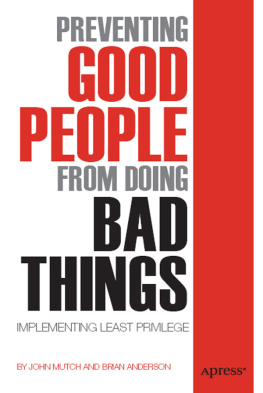

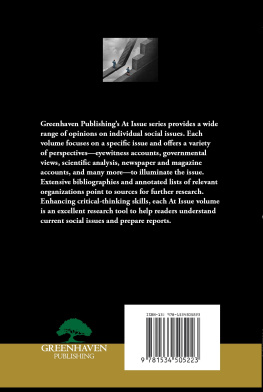
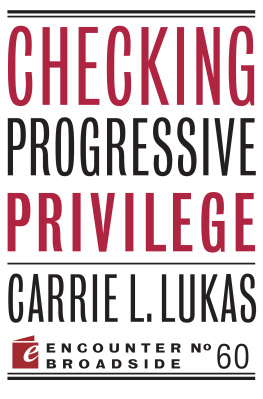




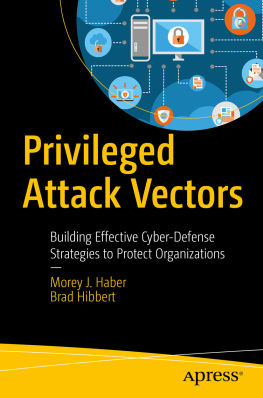

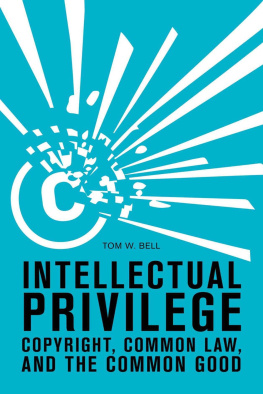

 John Mutch has been an operating executive and investor in the technology industry for over 30 years and has a long, sustained track record of creating shareholder value through both activities. Since 2008, he has served as chief executive officer (CEO) at BeyondTrust, the industry leader in mitigating insider threats across physical, virtual, and cloud information technology. Prior to joining BeyondTrust, Mutch was a founder and managing partner of MV Advisors, LLC, a strategic block investment firm that provides focused investment and strategic guidance to small- and mid-cap technology companies. Prior to founding MV Advisors, Mutch was appointed by a US bankruptcy court to the board of directors of Peregrine Systems in March 2003. He assisted that company in a bankruptcy workout proceeding and was named president and CEO in July 2003. Mutch ran Peregrine Systems, operating the company under an SEC consent decree, restating five years of operating results and successfully restructuring the company, culminating in a sale to Hewlett Packard for $425 million in December 2005. Prior to running Peregrine, Mutch served as president, CEO, and a director of HNC Software, an enterprise analytics software provider. Under his leadership, the company nearly doubled revenue and successfully spun out Retek in an IPO that returned more than $2.5 billion to shareholders. HNC Software was sold to Fair Isaac Corporation in August 2002 for $825 million. Prior to HNC Software, Mutch spent seven years at Microsoft Corporation in a variety of executive sales and marketing positions. He previously served on the boards of Edgar Online (NASDAQ: EDGR), Aspyra (Amex: APY), Overland Storage (NASDAQ: OVRL), and Brio Software.
John Mutch has been an operating executive and investor in the technology industry for over 30 years and has a long, sustained track record of creating shareholder value through both activities. Since 2008, he has served as chief executive officer (CEO) at BeyondTrust, the industry leader in mitigating insider threats across physical, virtual, and cloud information technology. Prior to joining BeyondTrust, Mutch was a founder and managing partner of MV Advisors, LLC, a strategic block investment firm that provides focused investment and strategic guidance to small- and mid-cap technology companies. Prior to founding MV Advisors, Mutch was appointed by a US bankruptcy court to the board of directors of Peregrine Systems in March 2003. He assisted that company in a bankruptcy workout proceeding and was named president and CEO in July 2003. Mutch ran Peregrine Systems, operating the company under an SEC consent decree, restating five years of operating results and successfully restructuring the company, culminating in a sale to Hewlett Packard for $425 million in December 2005. Prior to running Peregrine, Mutch served as president, CEO, and a director of HNC Software, an enterprise analytics software provider. Under his leadership, the company nearly doubled revenue and successfully spun out Retek in an IPO that returned more than $2.5 billion to shareholders. HNC Software was sold to Fair Isaac Corporation in August 2002 for $825 million. Prior to HNC Software, Mutch spent seven years at Microsoft Corporation in a variety of executive sales and marketing positions. He previously served on the boards of Edgar Online (NASDAQ: EDGR), Aspyra (Amex: APY), Overland Storage (NASDAQ: OVRL), and Brio Software. Brian Anderson brings more than 25 years of global enterprise software and security industry experience to this book. He has a track record for award-winning branding and product launches, as well as inbound and outbound marketing models to low-touch, scalable, measureable, and predictable results. Anderson is a frequent industry spokesperson and a published author. Since 2009, he has served as chief marketing officer at BeyondTrust, where he is responsible for all aspects of corporate brand development, as well as lead and demand generation to increase awareness and interest in all customer and investor segments.
Brian Anderson brings more than 25 years of global enterprise software and security industry experience to this book. He has a track record for award-winning branding and product launches, as well as inbound and outbound marketing models to low-touch, scalable, measureable, and predictable results. Anderson is a frequent industry spokesperson and a published author. Since 2009, he has served as chief marketing officer at BeyondTrust, where he is responsible for all aspects of corporate brand development, as well as lead and demand generation to increase awareness and interest in all customer and investor segments.